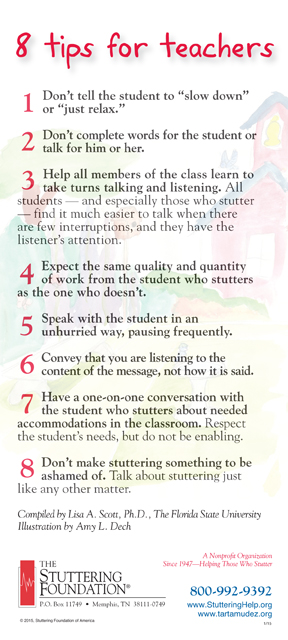 Download a PDF of this flyer in English and Spanish.
Download a PDF of this flyer in English and Spanish.
1. Don’t tell the student “slow down” or “ just relax.”
2. Don’t complete words for the student or talk for him or her.
3. Help all members of the class learn to take turns talking and listening. All students — and especially those who stutter — find it much easier to talk when there are few interruptions and they have the listener’s attention.
4. Expect the same quality and quantity of work from the student who stutters as the one who doesn’t.
5. Speak with the student in an unhurried way, pausing frequently.
6. Convey that you are listening to the content of the message, not how it is said.
7. Have a one-on-one conversation with the student who stutters about needed accommodations in the classroom. Respect the student’s needs, but do not be enabling.
8. Don’t make stuttering something to be ashamed of. Talk about stuttering just like any other matter.
Compiled by Lisa Scott, Ph.D., The Florida State University






 Podcast
Podcast Sign Up
Sign Up Virtual Learning
Virtual Learning Online CEUs
Online CEUs Streaming Video Library
Streaming Video Library